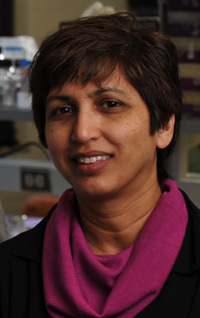
“Dedicate some of your life to others. Your dedication will not be a sacrifice. It will be an exhilarating experience because it is an intensive effort applied toward a meaningful end.”
Those are the words of Thomas A. Dooley, the 1948 Notre Dame alumnus and physician who became internationally famous for his devotion to the poor of Southeast Asia, his fondness for the University’s Grotto of Our Lady of Lourdes and his cheerful acceptance of death at 34 years of age.
Today, in the laboratories of the University’s Galvin Life Sciences Center, a team of researchers is expending intensive effort toward the meaningful goal of addressing the rare and neglected diseases of the world.
The Center for Rare and Neglected Diseases seeks to fill a huge hole brought on by the economics of healthcare. Although many people across the globe are suffering and dying from certain diseases, these diseases have been largely ignored by pharmaceutical companies because the potential financial rewards for developing new drugs and vaccines to treat them are paltry.
“The mission of the center is to develop therapies for these rare and neglected diseases and to develop outreach efforts to those suffering from them,” said Kasturi Haldar, Julius Nieuwland Professor of Biological Sciences and founding director of the center. “There are very few treatments for rare diseases. Neglected diseases disproportionately affect people in grinding poverty. The result is a gaping hole in world healthcare and Notre Dame is uniquely positioned to fulfill this mission.”
Haldar, who was Charles E. and Emma Morrison Professor of Pathology at Northwestern University before joining the Notre Dame faculty in 2008, points out that there are thousands of rare diseases, typically defined as those which afflict less than 200,000 people. Diseases in this category include cystic fibrosis, thalassemia, Niemann-Pick Type C disease and several rare forms of cancer.
Neglected diseases, on the other hand, affect billions worldwide but like rare diseases, they have been largely ignored by pharmaceutical companies and researchers. Many who suffer from neglected diseases such as tuberculosis, malaria and lymphatic filariasis live the developing world.
The center is composed of researchers from College of Science departments, such as biological sciences and chemistry and biochemistry, who have research experience in vaccine development and medical chemistry, from College of Engineering departments with expertise in drug delivery platforms, as well as faculty from the College of Arts and Letters and Center for Social Concerns who are involved in outreach to patient communities and social development programs..
As part of its effort to develop programs to address rare and neglected diseases, the center has struck up a partnership with a major pharmaceutical company. The venture combines Notre Dame’s strong basic research expertise in drug and vaccine targets and the company’s deep knowledge of discovering, developing and delivering drugs to the public.
Haldar also notes that Innovation Park at Notre Dame, the state-certified research park which will open this fall on 12 acres immediately south of campus and will house a variety of start-up businesses, offers another collaborative opportunity for innovative partnerships revolving around rare and neglected diseases.
The center also provides Notre Dame undergraduates with an opportunity to gain familiarity with rare and neglected diseases. Haldar explained that preprofessional students interested in medical careers have been doing clinical research examining clinical records on rare and neglected diseases. They help clinicians by carrying out such reviews. The students gain clearance for human subjects research while collecting important medical data that can be used in clinical trials.
In addition to promoting innovative research leading to novel diagnostics and drugs for rare and neglected diseases, the center also aims to raise awareness of such diseases.
“We seek to become advocates for those with neglected diseases like malaria and lymphatic filariasis and rare conditions like Niemann-Pick,” Haldar said. “Filling the void in drug and vaccine research that could help millions around the globe and making people more aware of their suffering fits Notre Dame’s mission really well.”